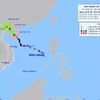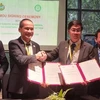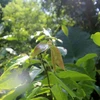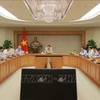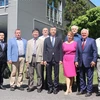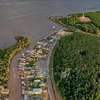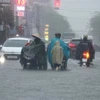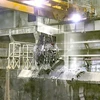The results of a PCB (Polychlorinated biphenyls) management initiative reflect Vietnam’s strong commitment to the Stockholm Convention on Persistent Organic Pollutants (POPs), stated Deputy Minister of Natural Resources and Environment Bui Cach Tuyen at a workshop in Hanoi on June 25.
PCBs are toxic agents commonly founded in the land, water, atmosphere, food and adipose tissue of human and animals. PCBs have been demonstrated to cause cancer and have a variety of other adverse health effects on the immune system, reproductive system, nervous system and endocrine system.
Reviewing the PCB project’s outcome, Tuyen said the project, with the aim to safely manage and discard the chemical, has thus far addressed a number of PCB issues in Vietnam.
According to him, the country did not involve the substance in production but did previously import equipment and petroleum that might contain PCBs.
Vietnam became a member of the Stockholm Convention in 2002 and committed to minimising PCB emissions in the environment, ending PCB usage in equipment and machineries by 2020 and destroying PCBs entirely by 2028. Therefore, imports were halted but it posed a range of challenges in disposing of materials containing PCBs. At the project outset, there were weak policies and regulation enforcement concerning management of the toxic agent, as well as a low PCB and POP awareness among businesses and the community.
Once the initiative was launched, its steering board inspected 50 state units and analysed almost 48,000 PCB equipment and machineries to indentify dangerous levels to be collected and stored.
Meanwhile, 34 documents were devised and amended, particularly the customs coordination mechanism and nine specifications guiding safe PCB management.-VNA
PCBs are toxic agents commonly founded in the land, water, atmosphere, food and adipose tissue of human and animals. PCBs have been demonstrated to cause cancer and have a variety of other adverse health effects on the immune system, reproductive system, nervous system and endocrine system.
Reviewing the PCB project’s outcome, Tuyen said the project, with the aim to safely manage and discard the chemical, has thus far addressed a number of PCB issues in Vietnam.
According to him, the country did not involve the substance in production but did previously import equipment and petroleum that might contain PCBs.
Vietnam became a member of the Stockholm Convention in 2002 and committed to minimising PCB emissions in the environment, ending PCB usage in equipment and machineries by 2020 and destroying PCBs entirely by 2028. Therefore, imports were halted but it posed a range of challenges in disposing of materials containing PCBs. At the project outset, there were weak policies and regulation enforcement concerning management of the toxic agent, as well as a low PCB and POP awareness among businesses and the community.
Once the initiative was launched, its steering board inspected 50 state units and analysed almost 48,000 PCB equipment and machineries to indentify dangerous levels to be collected and stored.
Meanwhile, 34 documents were devised and amended, particularly the customs coordination mechanism and nine specifications guiding safe PCB management.-VNA

